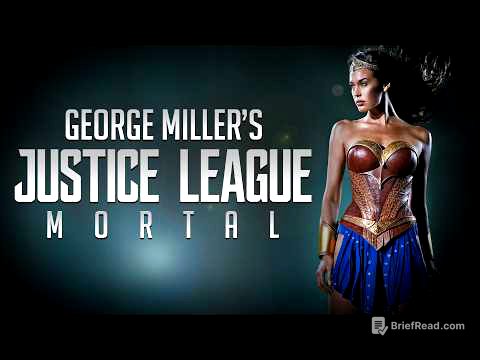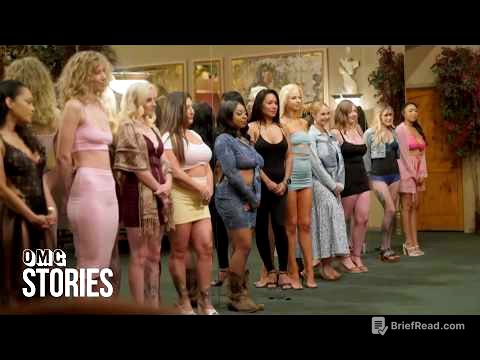TLDR;
This episode of Dub Talk covers the English dub of "Life Lessons with Uramichi Oniisan." The hosts discuss the show's premise, the quality of the dub (including the songs), and the voice acting performances. They also talk about the show's dark humor and how it relates to the experiences of adults in their 30s.
- The dub is praised for its accurate portrayal of the characters and its ability to capture the show's dark humor.
- The voice acting is considered to be excellent, with the hosts highlighting the performances of Adam Gibbs as Uramichi, Ray Chase as Usahara, and David Wald as Capellini.
- The show's themes of depression, disillusionment, and the struggles of adulthood are discussed in detail.
Intro and Disclaimers [0:00]
The host, Aman, introduces the episode and provides disclaimers, including a warning about language and spoilers for "Life Lessons with Uramichi Oniisan." He also clarifies that the views expressed are those of the individual hosts and not necessarily of the podcast as a whole. Aman then jokingly advises listeners to enjoy their childhood while it lasts, before the harsh realities of adulthood set in.
Podcast Introduction [1:10]
Jamal, the podcaster, introduces the episode's topic: the dub of "Life Lessons with Uramichi Oniisan." He is joined by Stephanie, Noah, and Andrew. Jamal explains his personal connection to the show, citing the interesting characters, his own apathy, and the existential crisis the show induced. Stephanie expresses her excitement for the episode.
Why This Anime? [3:13]
Jamal explains why he chose to cover "Life Lessons with Uramichi Oniisan," citing his connection to the main character's apathetic nature and the existential crisis the show triggered. He wanted to share this experience with the viewers. Stephanie mentions that she and Jamal were initially the only ones interested in doing an episode on the show.
Show's Premise [5:19]
The podcast describes the premise of "Life Lessons with Uramichi Oniisan": Uramichi, a miserable 31-year-old, hosts a children's TV show with two grown men in animal costumes and a short-tempered singing woman. The show contrasts the upbeat nature of children's programming with Uramichi's cynical outlook on life. The hosts note that the premise of adults hosting a live-action kids show with interacting children is rare in American television today, having been largely replaced by animated series and YouTube vlogs.
Modern Children's Entertainment [7:48]
The hosts discuss the current landscape of children's entertainment, noting the dominance of animated series and YouTube vlogs featuring kids and their parents playing games. They mention Blippi as a popular example of an adult performer who teaches life lessons to children through YouTube videos. The hosts find the premise of "Life Lessons with Uramichi Oniisan" to be alien compared to modern children's programming.
ADR Production Staff [11:45]
The hosts discuss the ADR (Automated Dialogue Replacement) director, Chris George, and scriptwriters, Aierly this Buke. They also mention the music staff, Don Bennett and Emmy Low, who adapted the songs for the show. The hosts celebrate Chris George's birthday and joke about doing a "rad Robert" for ADR group 40 characters.
Dubbed Songs [15:51]
The hosts express their surprise and appreciation that the songs in "Life Lessons with Uramichi Oniisan" were dubbed into English, which is not always a priority during simulcasts. They praise the quality of the singing and the lyrics, noting that they are simple and appropriate for children. The hosts joke about the show being shown in preschools, imagining the teachers relating to the content more than the children.
Cringy Songs and Japanese Honorifics [25:30]
The hosts discuss the cringy and corny nature of some of the songs, emphasizing that this is intentional. They mention a conversation with Aaron Dismuke, who confirmed that the use of Japanese language elements like "konichiwa" was deliberately cringy. The hosts agree that keeping the Japanese side of things merits the show because this is such a Japanese-centric programming.
Dark Comedy and Script Writing [29:47]
The hosts express their excitement about discussing the show's dark comedy, a genre they don't often cover. They compare the show to "Sayonara Zetsubou Sensei" and note that the script and music adaptations are brilliantly done. The hosts praise Chris George's directing for maintaining the comedic timing and preventing the characters from becoming too exaggerated.
Vernacular Phrases and Subtitles [35:08]
The hosts appreciate the use of vernacular phrases in the script, which contrasts with the on-set dialogue. They express a desire for Crunchyroll to offer subtitles with the dub to understand the original lines. The hosts transition to discussing the characters in groups of five.
Child Actors [37:43]
The hosts briefly discuss the child actors, praising their performances and noting that the dark humor doesn't come off as creepy. They emphasize that Uramichi genuinely cares about the kids. One of the hosts asks about a specific hairstyle seen on some of the girls in the show.
Merchandise and TV Staff [40:45]
The hosts introduce the characters who work behind the scenes: Kikaku, who works in merchandising, and two directors, one of whom is literally named "Director." They describe Kikaku as a miserable goth who is in charge of deciding new products to keep the show going. The hosts joke about the lazy names of the directors.
Vince K Kappalidi [47:02]
The hosts introduce Vince K Kappalidi, the choreographer, who they describe as looking like a gay boba bro. They mention that Kappalidi has a thing for Usahara. The hosts list the voice actors for these characters: Yog Bosche, Steven Food, J Michael Tatum, Eric Phil, and David Wald.
Kikaku [51:07]
The hosts discuss Kikaku, noting Johnny Yong Bosch's performance as an angry and furious character. They describe Kikaku's meltdowns and his interactions with Uebu, who posts non-existent merchandise online. The hosts contrast Kikaku's rage with his cheerful demeanor when he's not having a meltdown.
Uebu and JYB's Range [55:30]
The hosts discuss Uebu's limited role in the show and Johnny Yong Bosch's range as a voice actor. They note that Bosch doesn't often play major roles anymore but is still a naturally good voice to listen to. The hosts mention some of Bosch's previous roles, such as Ichigo Kurosaki and Vash the Stampede.
Steven Food as Uebu [58:28]
The hosts describe Steven Food's performance as Uebu as unassuming and intentionally flat. They note his dry sense of humor and his disinterest in 3D women. The hosts mention Uebu's interactions with Kikaku at the end-of-year wrap party.
Aman Director [1:03:04]
The hosts discuss J Michael Tatum's role as Aman Director, noting that he is less standout-ish than the other characters. They appreciate the wide range of people in the entertainment industry, from those passionate about their work to those just there for a paycheck. The hosts describe Aman as wanting to leave his mark on the world but not knowing what kind of program he's making.
Eric Vale as Director [1:08:01]
The hosts discuss Eric Vale's performance as Director, noting that he is good at playing characters you want to punch. They compare his voice to those of old Hollywood directors and note that he is oblivious to the [ __ ] he does. The hosts mention a story about Eric Vale expressing his dislike for a particular show he worked on.
David Wald as Kappalidi [1:15:55]
The hosts praise David Wald's performance as Kappalidi, noting his stoicism and professionalism. They emphasize that Kappalidi is a strong, independent woman who wants Usahara. The hosts appreciate Wald's ability to play fabulous characters and mention some of his other roles.
Usahara, Kumatani, Iketero, and Utano [1:20:51]
The hosts introduce the main characters: Usahara, Kumatani, Iketero, and Utano. They discuss their backgrounds, personalities, and voice actors: Ray Chase, Howard Wang, Brandon McInnis, and Jessica Calvello. The hosts note that Usahara and Kumatani went to school together and that the characters have crossed paths before.
Ray Chase as Usahara [1:28:26]
The hosts discuss Ray Chase's performance as Usahara, noting that it is different from his usual roles. They appreciate his ability to play an idiot who can't read a room. The hosts mention a scene where David Wald strikes Usahara in the nuts.
Howard Wang as Kumatani [1:36:20]
The hosts discuss Howard Wang's performance as Kumatani, noting that he is the dry and serious character who delivers bear puns well. They appreciate his grounded nature and his defining moment of quitting a job because his boss was being a [ __ ]. The hosts mention that Kumatani was a delinquent in high school.
Brandon McInnis as Iketero [1:42:37]
The hosts discuss Brandon McInnis's performance as Iketero, noting that he is the funniest character and has a dirty mind. They appreciate his youthful tone and his airheadedness. The hosts mention a scene where Iketero is disappointed that there won't be a pillow fight.
Jessica Calvello as Utano [1:51:15]
The hosts discuss Jessica Calvello's performance as Utano, noting that she has great pipes and used to work in children's theater. They appreciate that her voice is lower than expected and doesn't mimic a cutesy moe voice. The hosts mention that Utano is saddled with the stereotypical female problem of wanting to get married.
Adam Gibbs as Uramichi [2:01:01]
The hosts discuss Adam Gibbs's performance as Uramichi, noting that he has a pension for deadpan characters. They appreciate his ability to switch between his customer service voice and his sad, depressed voice. The hosts mention a scene where Uramichi has to do an advice segment with a puppet.
Final Thoughts [2:16:32]
The hosts share their final thoughts on the show, praising its biting edge, strong dub, and well-cast characters. They note that the show is not for everyone, as it deals with dark comedy and self-deprecating humor. The hosts discuss the show's themes of depression, mid-life crisis, and the struggles of adulthood.
Where to Watch and Support the Podcast [2:24:21]
The hosts provide information on where to watch the show and how to support the podcast. They mention that the show is available on Funimation and Crunchyroll, but there are some complexities regarding the streaming options. The hosts encourage listeners to leave comments with any clarifications. They also provide links to their social media accounts and other projects.









